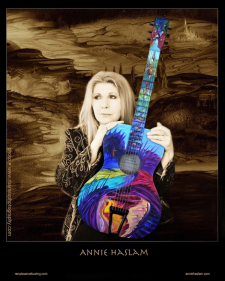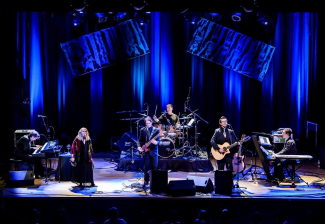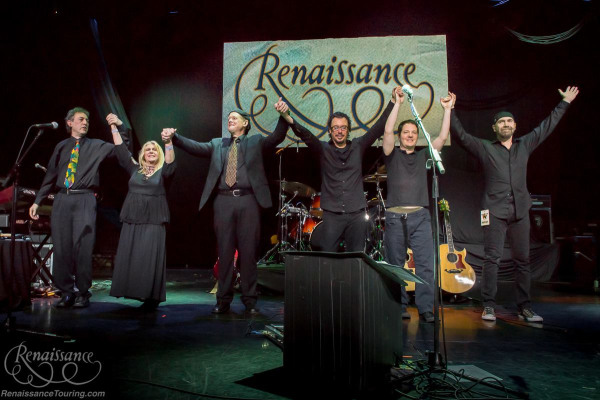INTERVIEW: Renaissance’s Annie Haslam on loss, longevity, Leonardo da Vinci

Renaissance, the progressive rock band that has been touring and producing music for decades, has seen its fair share of triumphs and emotional setbacks. Lead singer Annie Haslam, who is also a successful artist, has weathered many storms, perhaps none more tragic than when she lost her longtime musical partner, Michael Dunford, in 2012. Since then, the band has rebounded with a new album, Symphony of Light, and a couple new tours. Haslam continues to carry the Renaissance flag for fans and future generations.
Renaissance’s latest tour brings them to The Concert Hall in New York Friday, Oct. 24, followed by gigs in Glenside, Pa., near Philadelphia; Natick, Mass.; Albany, N.Y.; Londonderry, N.H.; Fall River, Mass.; and Hartford, Conn. The band — made famous for songs like “Northern Lights,” “Carpet of the Sun” and “Ashes are Burning” — is ready to mix old with new.
“Well, we’re doing five pieces from the new album,” Haslam said recently during a phone interview. “What I did is I had a dress made of the album cover made in silk. … For the New York and the Philadelphia shows, we’re having a backdrop behind us with every song has its own painting behind on stage. It’s going to be very colorful and bright and different. Really excited about that.”
The dress and backdrop is further proof of Haslam’s expertise at melding together her love for music and art. The next challenge for her and the six-person band is drawing enough interest to take Renaissance “further afield” and out of the Northeast touring circuit.
“We’re working on spreading our wings,” she said, adding that touring this many musicians plus the crew is difficult.

One of the songs that audience members will hear is the title track from the new album, “Symphony of Light,” an opus about Leonardo da Vinci. “At the beginning of it, when I sing the prelude is when he’s an old man,” she said. “The king of France … absolutely adored Leonardo’s work and took him for the last two years of his life, gave him an apartment in his chateau, and he looked after him like he was his own father.”
The opening of the song features da Vinci waking up in France, opening the curtain of his room and connecting with the “universal light.” Haslam called the famous painter the “man of everything,” a true Renaissance Man. “He also sang, and just recently I read that when he painted, birds would fly around his studio with him,” she said. “They’d fly in the windows and surround him — amazing. So that’s what that song is about. … Where it kind of goes a bit crazy in the middle … is where he’s put the painting on one side to do the inventions, the weapons of war that he was designing. That’s why it gets a bit frantic in that little bit, and then later on when you get through that, it comes back up into this beautiful orchestral moment where it all rises up and gets really big orchestral. And that’s where he starts painting again.”
Renaissance’s songs, which bring together classical influences with rock music, often have this level of in-depth backstory. The early songs were written by Dunford and Betty Thatcher, who was a poet and credited with writing the big hits for the band.
“I started to write for the band in 2001 when we did the album Tuscany, and then when we got the band back together in 2009, we really wanted to get an album together,” Haslam said. “Obviously the record industry is so different now, and the big labels have merged, not really interested in heritage bands really. They want the big bands that they know that they’re going to make the money or something brand new for the kids, you know, younger artists. We went the way of Kickstarter, which was fantastic.”
In their estimation, the only way to record a new album was to bring the fans into the financial equation. At first, they felt embarrassed, but they knew the reality: If they didn’t raise the money themselves, there was a good chance no album would materialize. In 2012, they asked for $44,000, according to their Kickstarter page, and fans pledged more than $92,000. The album was made and released by the band members, and then a distribution deal came along. That led to Symphony of Light, which has three additional songs from the previous album (known as Grandine il Vento). “The last song on that album is called ‘Renaissance Man,’ and that’s Michael Dunford,” she said. “It’s a tribute to him, and Rave Tesar and I wrote that song together for Michael.”

When Dunford died in late 2012, thoughts of ending Renaissance never entered Haslam’s mind.
“I didn’t think that at all, and I know that Michael wouldn’t have wanted that — absolutely not because I’m not finished yet. The album … was just coming out, and it would be giving up, to do all that work for the album that we all worked so hard on. It was great to have all those musicians on an album because they had been playing with us since 2009, and Rave Tesar and David Keyes had been with me in my solo band as well. It would have been very sad to just give up. I never thought of giving up. I was very sad about it, but I knew that we needed to carry on because it makes people so happy. They just love it. There’s nothing like it. There’s still nothing like our music. Even with the new album a lot of fans are likening it to Return of the Cards, which is a wonderful thing to say really because that’s one of our top albums, but it’s got that kind of feel. Even though every song on the album is really different from each other, they all blend together. They all work.”
That music often leads to standing ovations, although Haslam admitted that Dunford had doubts on how a song about da Vinci would go over with the crowd.
“When we were in the studio and we got this piece of music, I said, ‘Mick, I’d really … like to write a song dedicated to Leonardo da Vinci.’ I said, ‘I don’t know why really. I just feel I need to do that.’ Because in painting I channel my artist channels so it comes from all over the place. Wherever it comes from I don’t know. It’s like turning on a tap, and it just pours out. I never think about what I’m doing; it just pours out. So I feel I’ve got a connection with him, a very strong connection with Leonardo da Vinci.”
Dunford said no, saying the connection to the famed Italian painter was too literal. Haslam pointed out that a song had been written about Vincent van Gogh, but Dunford was apparently still not convinced. So the singer started leaving a big book of da Vinci’s paintings in the studio on the piano. Eventually the band gave in and recorded the track. To her surprise, Haslam said the song actually became Dunford’s favorite part of the new album.
“That was his favorite song,” she said. “And he looked at me and he said, ‘I know you’re going to say I told you so.’ But it’s magnificent. It’s just a magnificent piece of music. I love it. I think it’s just, it’s a real good progression for us from what we did before. We kind of strayed drastically when we did two albums called Timeline and Camera Camera. That was in the ‘80s. At that point I wasn’t very strong-minded as far as music. I kind of followed everybody. I was a different person really. I felt, well, I don’t know about this because it sounds like anybody else could do this with me singing on top of it. … I feel like we’ve got back on track, and Mickey felt that as well. We just managed to finish the album with him, just finished his parts, and then he left. It was very sad, very sad.”
Haslam is open when talking about those difficult weeks near the end of 2012. She had suffered from a dislocated compression in her vertebra and in a metal brace for nine months. The band had to cancel large parts of its tour because the singer was not allowed to fly or travel in a vehicle for more than three hours.
“So we did the shows that were left on the East Coast and canceled the Florida and Atlanta dates and everything. Of course, we lost money. But the last show we would have redeemed some of the money that we would have lost, but unfortunately we had to cancel that last show because of [Superstorm] Sandy. So we lost a lot.”
Dunford’s final show proved to be in Collingswood, N.J. He was able to book one of the last flights to England before the storm, and Haslam didn’t hear anything until a few weeks later.
“On the 19th of November, his wife called me and said Michael has had a cerebral hemorrhage, and he’s only got a few hours to live,” she said. “I just never forget that as long as I live, and he died the next day. You never know. You just don’t know really. You have got to make the best of every single day. You’ve got to be as good as you can be. Smile at everybody you see on the street because so many people are so miserable and upset now because of what’s going on with their lives and what’s going on with the planet. It’s sad times really. It does make me good to go out and make people feel good at this time, more than ever I think. More than ever.”
By John Soltes / Publisher / John@HollywoodSoapbox.com

